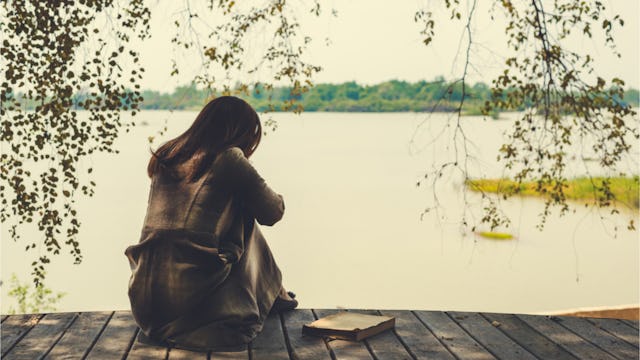Losing A Parent Is Hell, So Stop Telling Me To 'Get Over' My Grief

As I held the phone to my ear, listening to the sounds of the ICU in my father’s hospital room as he lay dying, I thought, This is the hard part. This was the part that I’d prepared my heart for, the inevitable day that we all knew was coming after my father’s diagnosis of esophageal cancer nine months prior. Every chemotherapy setback, every hospital admission, every missed family gathering had led us here. We knew cancer was going to rob us of our father and my kids of their grandfather.
He was dying, and his cancer-ridden body would finally be at rest.
I was 1,600 miles away and helpless to do anything but whisper to my father through the phone I clutched in my hands as I sobbed.
When the nurse got on the phone and said, “It’s over. He’s gone,” I breathed a sigh of relief.
My father was at peace.
The worst was over, I told myself.
But my grief journey was just starting. And it’s been excruciating, painful, and wonderful, all in different stages.
Though it’s been five years since the day I said goodbye to my father, I still grieve him every day. Not a day goes by that my heart doesn’t feel the pang of sorrow when I want to share a professional success with him or when I catch a glimpse of his smile on my son’s face.
I am not over my grief, and I never will be.
And I’m grateful.
Grief is not an emotion that is fleeting like anger or sadness. Some say grief is a process, but I disagree. By calling grief a “process,” the implication is that there is an end. A final moment where you say, “Yup! I’m done now. I don’t miss my dad anymore.”
But that is simply not the case.
My grief is here to stay, and I’d appreciate it if you’d stop asking me to get over it.
In fact, if I’m being honest, I like who I’ve become since I’ve had to process my grief over my father’s death. Grief has made me a better friend when my friends have lost their parents. Through my experience, I know that doing a friend’s laundry during a crisis means more than any lasagna you can shove in their fridge. And I know that funeral flowers just wind up dying and in the garbage, so I show up with wine instead.
Grief has made me more empathetic to strangers. I don’t judge as quickly when a cashier is short with me or when someone cuts me off in traffic because I wonder if they are having a day like I did shortly after my father passed away. The day when I had an anxiety attack in the parking lot at the grocery store and had to abandon my cart because I was crying too hard to lift the bags. The man who screamed at me that day for not replacing my cart can rot in hell as far as I’m concerned. People who are carrying the burden of grief aren’t wearing T-shirts that say, “Be nice to me, my sister just died.” I’ve learned to practice kindness more often, thanks to grief.
I know not to tilt my head at a PTA meeting and say “How are you doing?” to a friend who has just lost her mother. Because I know she is fucking falling apart, and and it’s all she can do not to break the school windows with the gavel in her hands. Rather, I say “Death fucking sucks” instead. Because it does, and I needed someone to say that to me in the early months. Grief has stripped away my social filter and has made me braver, bolder.
On the day my father died, I became part of a club that I didn’t know existed. The “I’ve Lost a Parent” club members quietly and bravely carry their pain as they go about the business of raising kids, chasing job promotions, and managing a household. The members of this club wearily welcome new members by simply saying, “Me too,” and I’ve been welcomed with open arms. The friends who have shared their experiences and the ones who haven’t judged me for my anger as I’ve navigated my grief path are the people I try to emulate when I’m offering support.
You will never hear me say “He’s better off” or “It was God’s plan” to a friend who tells me she is hurting from grief that threatens to swallow her whole. My grief has taught me that sitting in silence with a friend as she cries or the simple act of saying “I see your pain” is what will really make a difference. Simple gestures like showing up to take care of carpool when you know a friend is struggling or arranging to show up with a hot meal for her family says that you understand where she is in her grief. Grief has made me understand that actions really do speak louder than words.
I didn’t ask for grief to enter my world, and watching my father die was absolute hell. But for all the sadness and pain, the days when my heart hurts so bad that I think it might actually be breaking, I wouldn’t trade my grief for anything.
Grief has been a gift in my life because it causes me to feel deep, raw emotion. And those feelings remind me that cancer didn’t erase my father from my memories. Yes, death fucking sucks, but through the tapestry of memories and a whole lot of tears, my father feels closer to me than ever, thanks to the grieving process.
So stop asking me to get over it. I don’t want to get over it.
This article was originally published on